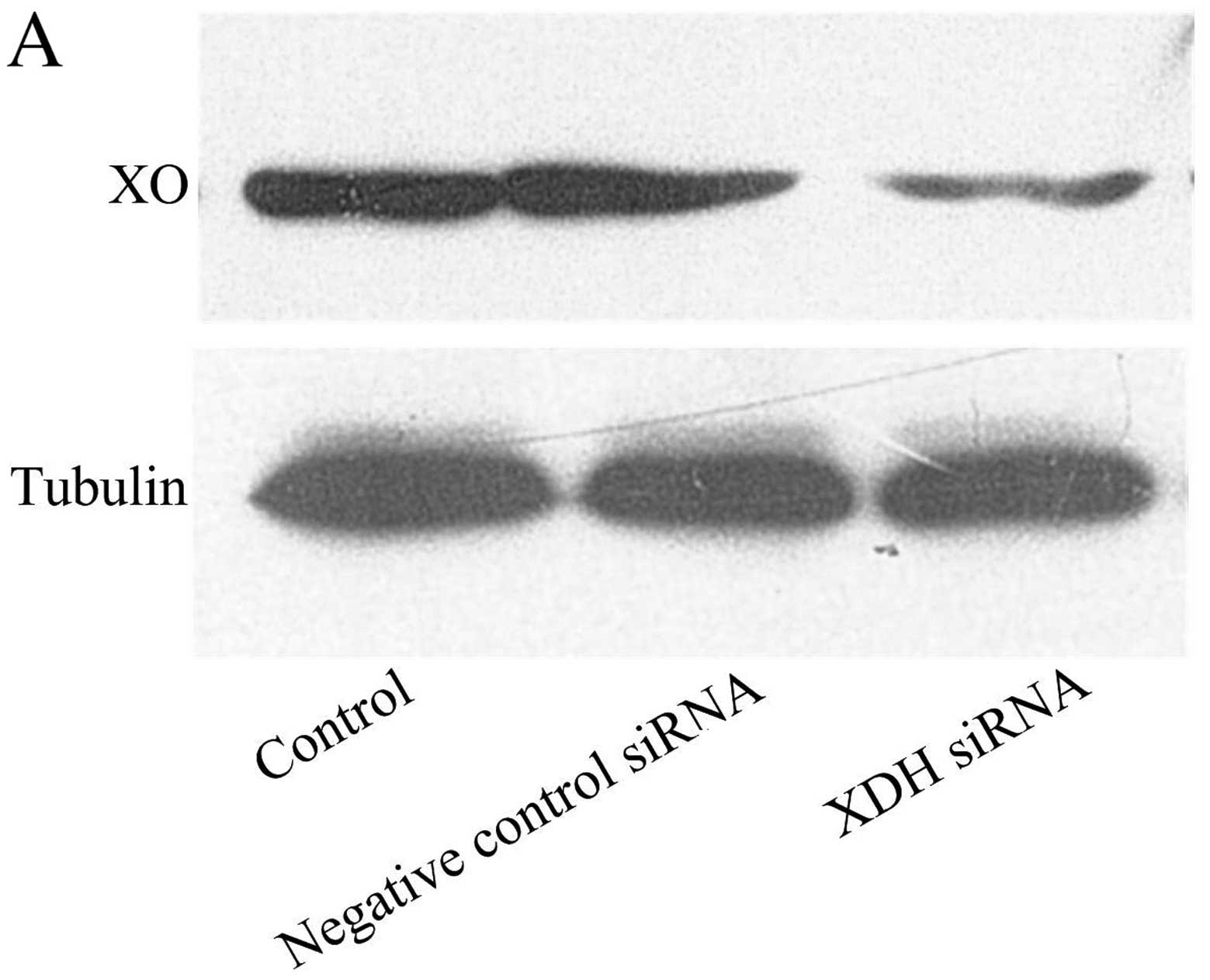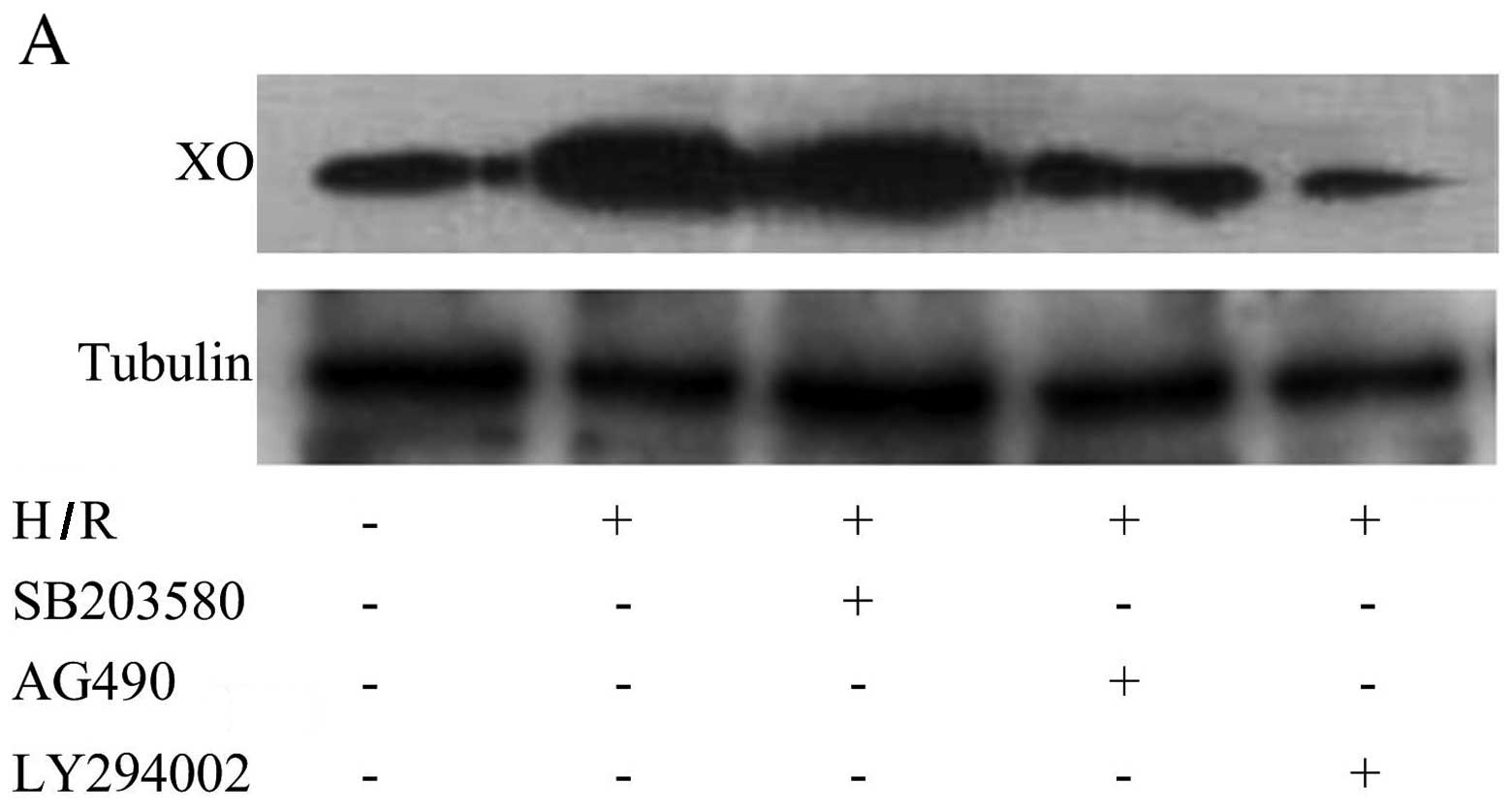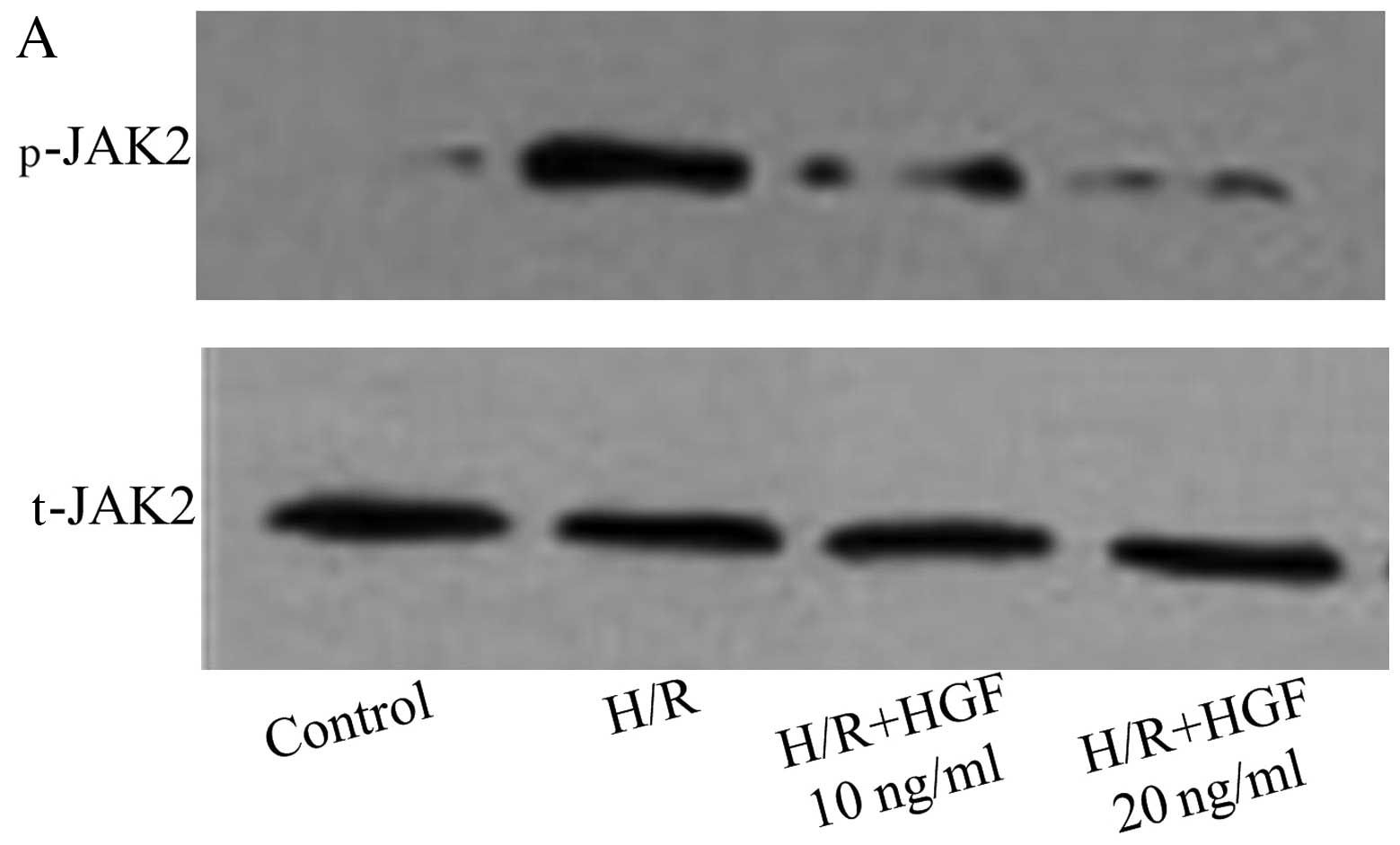|
1
|
Yu G, Peng T, Feng Q and Tyml K: Abrupt
reoxygenation of microvascular endothelial cells after hypoxia
activates ERK1/2 and JNK1, leading to NADPH oxidase-dependent
oxidant production. Microcirculation. 14:125–136. 2007. View Article : Google Scholar : PubMed/NCBI
|
|
2
|
Zhang T, Yang D, Fan Y, Xie P and Li H:
Epigallocatechin-3-gallate enhances ischemia/reperfusion-induced
apoptosis in human umbilical vein endothelial cells via AKT and
MAPK pathways. Apoptosis. 14:1245–1254. 2009. View Article : Google Scholar : PubMed/NCBI
|
|
3
|
Dhar-Mascareño M, Cárcamo JM and Golde DW:
Hypoxia-reoxygenation-induced mitochondrial damage and apoptosis in
human endothelial cells are inhibited by vitamin C. Free Radic Biol
Med. 38:1311–1322. 2005. View Article : Google Scholar : PubMed/NCBI
|
|
4
|
Pearlstein DP, Ali MH, Mungai PT, Hynes
KL, Gewertz BL and Schumacker PT: Role of mitochondrial oxidant
generation in endothelial cell responses to hypoxia. Arterioscler
Thromb Vasc Biol. 22:566–573. 2002. View Article : Google Scholar : PubMed/NCBI
|
|
5
|
Jang H-J, Koo BK, Lee HS, Park JB, Kim JH,
Seo MK, Yang HM, Park KW, Nam CW, Doh JH and Kim HS: Safety and
efficacy of a novel hyperaemic agent, intracoronary nicorandil, for
invasive physiological assessments in the cardiac catheterization
laboratory. Eur Heart J. 34:2055–2062. 2013. View Article : Google Scholar : PubMed/NCBI
|
|
6
|
Meneshian A and Bulkley GB: The physiology
of endothelial xanthine oxidase: from urate catabolism to
reperfusion injury to inflammatory signal transduction.
Microcirculation. 9:161–175. 2002. View Article : Google Scholar : PubMed/NCBI
|
|
7
|
Landmesser U, Spiekermann S, Preuss C,
Sorrentino S, Fischer D, Manes C, Mueller M and Drexler H:
Angiotensin II induces endothelial xanthine oxidase activation:
role for endothelial dysfunction in patients with coronary disease.
Arterioscler Thromb Vasc Biol. 27:943–948. 2007. View Article : Google Scholar : PubMed/NCBI
|
|
8
|
Spiekermann S, Landmesser U, Dikalov S,
Bredt M, Gamez G, Tatge H, Reepschläger N, Hornig B, Drexler H and
Harrison DG: Electron spin resonance characterization of vascular
xanthine and NAD(P)H oxidase activity in patients with coronary
artery disease: Relation to endothelium-dependent vasodilation.
Circulation. 107:1383–1389. 2003. View Article : Google Scholar : PubMed/NCBI
|
|
9
|
Berry CE and Hare JM: Xanthine
oxidoreductase and cardiovascular disease: molecular mechanisms and
pathophysiological implications. J Physiol. 555:589–606. 2004.
View Article : Google Scholar
|
|
10
|
Sulikowski T, Domanski L, Ciechanowski K,
Adler G, Pawlik A, Safranow K, Dziedziejko V, Chlubek D and
Ciechanowicz A: Effect of trimetazidine on xanthine oxidoreductase
expression in rat kidney with ischemia-reperfusion injury. Arch Med
Res. 39:459–462. 2008. View Article : Google Scholar : PubMed/NCBI
|
|
11
|
McNally JS, Saxena A, Cai H, Dikalov S and
Harrison DG: Regulation of xanthine oxidoreductase protein
expression by hydrogen peroxide and calcium. Arterioscler Thromb
Vasc Biol. 25:1623–1628. 2005. View Article : Google Scholar : PubMed/NCBI
|
|
12
|
Kayyali US, Donaldson C, Huang H,
Abdelnour R and Hassoun PM: Phosphorylation of xanthine
dehydrogenase/oxidase in hypoxia. J Biol Chem. 276:14359–14365.
2001.PubMed/NCBI
|
|
13
|
Wang G, Qian P, Jackson FR, Qian G and Wu
G: Sequential activation of JAKs, STATs and xanthine
dehydrogenase/oxidase by hypoxia in lung microvascular endothelial
cells. Int J Biochem. Cell Biol. 40:461–470. 2008.
|
|
14
|
Reviriego-Mendoza MM and Santy LC: The
cytohesin guanosine exchange factors (GEFs) are required to promote
HGF-mediated renal recovery after acute kidney injury (AKI) in
mice. Physiol Rep. 3:e124422015. View Article : Google Scholar : PubMed/NCBI
|
|
15
|
White HM, Acton AJ, Kamocka MM and
Considine RV: Hepatocyte growth factor regulates neovascularization
in developing fat pads. Am J Physiol Endocrinol Metab.
306:E189–E196. 2014. View Article : Google Scholar :
|
|
16
|
Zhang Y, Hu S and Chen Y: Hepatocyte
growth factor suppresses hypoxia/reoxygenationinduced XO activation
in cardiac microvascular endothelial cells. Heart Vessels.
30:534–544. 2015. View Article : Google Scholar
|
|
17
|
Nishida M, Carley WW, Gerritsen ME,
Ellingsen O, Kelly RA and Smith TW: Isolation and characterization
of human and rat cardiac microvascular endothelial cells. Am J
Physiol. 264:H639–H652. 1993.PubMed/NCBI
|
|
18
|
Zhang Z, Li W, Sun D, Zhao L, Zhang R,
Wang Y, Zhou X, Wang H and Cao F: Toll-like receptor 4 signaling in
dysfunction of cardiac microvascular endothelial cells under
hypoxia/reoxygenation. Inflamm Res. 60:37–45. 2011. View Article : Google Scholar
|
|
19
|
Ladilov Y, Schäfer C, Held A, Schäfer M,
Noll T and Piper HM: Mechanism of Ca(2+) overload in endothelial
cells exposed to simulated ischemia. Cardiovasc Res. 47:394–403.
2000. View Article : Google Scholar : PubMed/NCBI
|
|
20
|
Yu G, Bolon M, Laird DW and Tyml K:
Hypoxia and reoxygenation-induced oxidant production increase in
microvascular endothelial cells depends on connexin40. Free Radic
Biol Med. 49:1008–1013. 2010. View Article : Google Scholar : PubMed/NCBI
|
|
21
|
Loor G, Kondapalli J, Iwase H, Chandel NS,
Waypa GB, Guzy RD, Vanden Hoek TL and Schumacker PT: Mitochondrial
oxidant stress triggers cell death in simulated
ischemia-reperfusion. Biochim Biophys Acta. 1813:1382–1394. 2011.
View Article : Google Scholar :
|
|
22
|
Kong R, Jia G, Cheng ZX, Wang YW, Mu M,
Wang SJ, Pan SH, Gao Y, Jiang HC, Dong DL and Sun B:
Dihydroartemisinin enhances Apo2L/TRAIL-mediated apoptosis in
pancreatic cancer cells via ROS-mediated up-regulation of death
receptor 5. PLoS One. 7:e372222012. View Article : Google Scholar : PubMed/NCBI
|
|
23
|
Przygodzki T, Sokal A and Bryszewska M:
Calcium ionophore A23187 action on cardiac myocytes is accompanied
by enhanced production of reactive oxygen species. Biochim Biophys
Acta. 1740:481–488. 2005. View Article : Google Scholar : PubMed/NCBI
|
|
24
|
Rasband WS: ImageJ. U.S National
Institutes of Health; Bethesda, MD: 1997–2012
|
|
25
|
Chatterjee S, Browning EA, Hong N, DeBolt
K, Sorokina EM, Liu W, Birnbaum MJ and Fisher AB: Membrane
depolarization is the trigger for PI3K/Akt activation and leads to
the generation of ROS. Am J Physiol Heart Circ Physiol.
302:H105–H114. 2012. View Article : Google Scholar :
|
|
26
|
Kelley EE, Khoo NK, Hundley NJ, Malik UZ,
Freeman BA and Tarpey MM: Hydrogen peroxide is the major oxidant
product of xanthine oxidase. Free Radic Biol Med. 48:493–498. 2010.
View Article : Google Scholar :
|
|
27
|
Saito S, Ogawa J and Minamiya Y: Pulmonary
reexpansion causes xanthine oxidase-induced apoptosis in rat lung.
Am J Physiol Lung Cell Mol Physiol. 289:L400–L406. 2005. View Article : Google Scholar : PubMed/NCBI
|
|
28
|
Krause GS, White BC, Aust SD, Nayini NR
and Kumar K: Brain cell death following ischemia and reperfusion: A
proposed biochemical sequence. Crit Care Med. 16:714–726. 1988.
View Article : Google Scholar : PubMed/NCBI
|
|
29
|
Ono T, Tsuruta R, Fujita M, Aki HS,
Kutsuna S, Kawamura Y, Wakatsuki J, Aoki T, Kobayashi C, Kasaoka S,
et al: Xanthine oxidase is one of the major sources of superoxide
anion radicals in blood after reperfusion in rats with forebrain
ischemia/reperfusion. Brain Res. 1305:158–167. 2009. View Article : Google Scholar : PubMed/NCBI
|
|
30
|
Therade-Matharan S, Laemmel E, Duranteau J
and Vicaut E: Reoxygenation after hypoxia and glucose depletion
causes reactive oxygen species production by mitochondria in HUVEC.
Am J Physiol Regul Integr Comp Physiol. 287:R1037–R1043. 2004.
View Article : Google Scholar : PubMed/NCBI
|
|
31
|
Dai T, Zheng H and Fu GS: Hypoxia confers
protection against apoptosis via the PI3K/Akt pathway in
endothelial progenitor cells. Acta Pharmacol Sin. 29:1425–1431.
2008. View Article : Google Scholar : PubMed/NCBI
|
|
32
|
Shimizu S, Yonezawa R, Hagiwara T, Yoshida
T, Takahashi N, Hamano S, Negoro T, Toda T, Wakamori M, Mori Y and
Ishii M: Inhibitory effects of AG490 on
H2O2-induced TRPM2-mediated Ca(2+) entry. Eur
J Pharmacol. 742:22–30. 2014. View Article : Google Scholar : PubMed/NCBI
|
|
33
|
Saksela M, Lapatto R and Raivio KO:
Irreversible conversion of xanthine dehydrogenase into xanthine
oxidase by a mitochondrial protease. FEBS Lett. 443:117–120. 1999.
View Article : Google Scholar : PubMed/NCBI
|



















